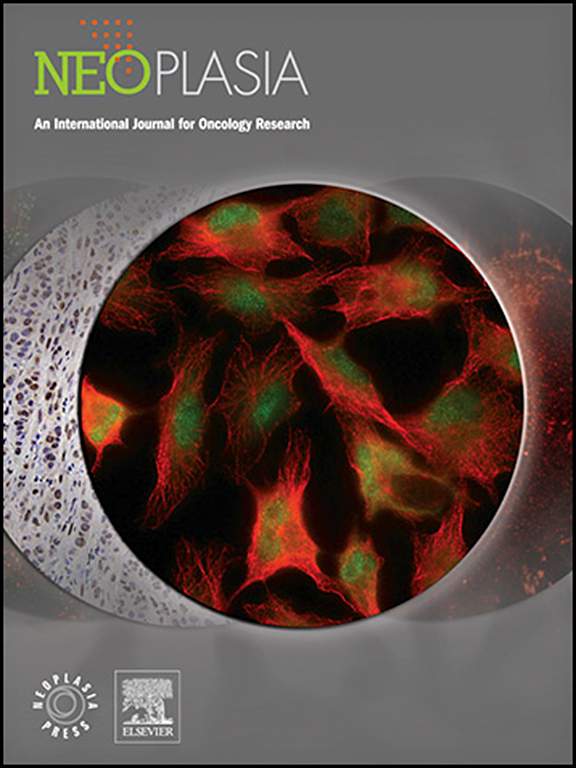High metastatic tumor-derived CXCL16 mediates liver colonization metastasis by inducing Kupffer cell polarization via the PI3K/AKT/FOXO3a pathway
IF 7.7
2区 医学
Q1 Biochemistry, Genetics and Molecular Biology
引用次数: 0
Abstract
Liver metastases represent a late-stage manifestation of numerous cancers, often associated with poor patient prognosis. Kupffer cells (KCs), resident liver macrophages, play a critical role in liver metastasis (LM). However, the mechanisms by which the polarization of KCs facilitate colorectal cancer (CRC) liver metastases remain elusive. Here, we established a CRC liver metastasis mouse model and employed a co-culture system, found that KCs were recruited and polarized to M2 phenotype. We isolated and purified highly metastatic cell lines to reveal potential changes in CRC cells during metastasis. Through bulk RNA sequencing, we identified and validated CXCL16 as a positive mediator in liver-metastatic CT26-LM cells that induced an M2-like KC phenotype. Knock down of CXCL16 reduced the M2 polarization of KCs and inhibited the formation of liver metastasis lesions. Next, this polarization process was shown to be achieved through the PI3K/AKT/FOXO3a pathway. Further investigation revealed FOXO3a transcriptionally activates CD206(MRC1) in this process. Pharmacological inhibition of the CXCL16-PI3K-FOXO3a axis to disrupt the polarization of KCs attenuated CRC liver metastasis in vivo. Our findings collectively indicate that targeting the CXCL16/PI3K/AKT/FOXO3a pathway in KCs may represent a promising therapeutic strategy for preventing CRC liver metastasis.

高转移性肿瘤源性CXCL16通过PI3K/AKT/FOXO3a通路诱导Kupffer细胞极化介导肝脏定植转移
肝转移是许多癌症的晚期表现,通常与患者预后不良有关。库普弗细胞(KCs)是常驻肝巨噬细胞,在肝转移(LM)中起着关键作用。然而,KCs极化促进结直肠癌(CRC)肝转移的机制尚不清楚。在此,我们建立了CRC肝转移小鼠模型,并采用共培养系统,发现KCs被募集并极化为M2表型。我们分离纯化了高转移细胞系,以揭示CRC细胞在转移过程中的潜在变化。通过大量RNA测序,我们鉴定并验证了CXCL16是肝转移CT26-LM细胞中诱导m2样KC表型的阳性介质。下调CXCL16可降低KCs的M2极化,抑制肝转移灶的形成。接下来,这种极化过程被证明是通过PI3K/AKT/FOXO3a通路实现的。进一步的研究发现FOXO3a转录激活CD206(MRC1)在这个过程中。体内药理抑制CXCL16-PI3K-FOXO3a轴破坏KCs减弱CRC肝转移的极化我们的研究结果共同表明,靶向KCs中的CXCL16/PI3K/AKT/FOXO3a通路可能是预防结直肠癌肝转移的一种有希望的治疗策略。
本文章由计算机程序翻译,如有差异,请以英文原文为准。
求助全文
约1分钟内获得全文
求助全文
来源期刊

Neoplasia
医学-肿瘤学
CiteScore
9.20
自引率
2.10%
发文量
82
审稿时长
26 days
期刊介绍:
Neoplasia publishes the results of novel investigations in all areas of oncology research. The title Neoplasia was chosen to convey the journal’s breadth, which encompasses the traditional disciplines of cancer research as well as emerging fields and interdisciplinary investigations. Neoplasia is interested in studies describing new molecular and genetic findings relating to the neoplastic phenotype and in laboratory and clinical studies demonstrating creative applications of advances in the basic sciences to risk assessment, prognostic indications, detection, diagnosis, and treatment. In addition to regular Research Reports, Neoplasia also publishes Reviews and Meeting Reports. Neoplasia is committed to ensuring a thorough, fair, and rapid review and publication schedule to further its mission of serving both the scientific and clinical communities by disseminating important data and ideas in cancer research.
 求助内容:
求助内容: 应助结果提醒方式:
应助结果提醒方式:


